Managing Sleep During Times of Stress
😴 Introduction: When Stress Steals Your Sleep
You climb into bed exhausted, hoping to finally rest. But as soon as your head hits the pillow, your brain starts working overtime.
Thoughts race, worries spiral, and before you know it, it’s 2 a.m. — again.
You’re not broken. You’re stressed.
And stress has a direct, measurable impact on sleep quality, circadian rhythm, and hormone balance. In fact, chronic stress is one of the most common causes of insomnia and nighttime awakenings in adults.
But here’s the good news: while you can’t always eliminate stress, you can train your body to stay calm during it — and sleep can become your most powerful recovery tool.
In this article, we’ll explore how stress disrupts your sleep, the mind-body systems involved, and what science says about the most effective natural strategies and supplements for deep, restorative rest even in stressful times. 🌿
Looking for supplements for this? Click here.
🧠 Part 1: How Stress Disrupts Sleep

⚡ The Cortisol-Melatonin Tug-of-War
Your body runs on rhythm — a 24-hour cycle known as the circadian rhythm.
Cortisol, the “get-up-and-go” hormone, rises in the morning.
Melatonin, the “wind-down” hormone, rises at night.
Under chronic stress, this balance gets flipped:
Cortisol stays high in the evening.
Melatonin production is delayed or suppressed.
The result? You feel tired but wired — physically drained but mentally alert.
💥 The Nervous System Overdrive
Your autonomic nervous system has two modes:
| System | Function | When Active |
|---|---|---|
| Sympathetic (SNS) | Fight-or-flight | Stress, deadlines, anxiety |
| Parasympathetic (PNS) | Rest-and-digest | Calm, digestion, sleep |
Chronic stress keeps your SNS stuck in overdrive, making it nearly impossible to relax. Your heart rate stays elevated, breathing shallow, muscles tense — all of which send a signal to your brain: “It’s not safe to sleep.”
That’s why techniques that activate the parasympathetic system — like deep breathing, meditation, or magnesium supplementation — are so effective.
🩸 The Chemical Impact of Stress on Sleep
Chronic stress floods the body with cortisol, norepinephrine, and adrenaline — hormones designed to keep you awake and alert.
Meanwhile, it depletes calming neurotransmitters like GABA, serotonin, and glycine.
That biochemical imbalance triggers insomnia, racing thoughts, and restless sleep cycles.
Long-term, this leads to:
Increased nighttime awakenings
Reduced deep sleep (slow-wave sleep)
Shorter REM phases
Elevated morning fatigue
🧬 The Mind-Body Feedback Loop
The cruel twist? Poor sleep increases stress — which worsens sleep.
When you don’t sleep enough, your body produces more cortisol, and your emotional regulation centers (like the amygdala) become hypersensitive.
You become more reactive, anxious, and emotionally volatile — fueling the cycle of sleepless stress.
Breaking that cycle means working with both your mind (psychological triggers) and your body (biochemical signals) at the same time.
🌿 Part 2: Supplements That Support Sleep During Stress
When stress disrupts sleep, the goal isn’t to knock yourself out — it’s to rebalance the nervous system.
Here are the most research-backed nutrients and adaptogens that help calm the mind, regulate cortisol, and promote restful sleep.
🧂 1️⃣ Magnesium Glycinate — The Anti-Stress Mineral
Magnesium supports over 300 biochemical reactions, including muscle relaxation and GABA activity (the neurotransmitter that quiets the brain).
How it helps:
Reduces cortisol and adrenaline spikes
Relaxes muscles and nerves
Improves sleep continuity
Best form: Magnesium glycinate or threonate (gentle and well absorbed).
Dosage: 200–400 mg before bed.
💡 Pro tip: Pair with L-theanine for mental calm.
🍵 2️⃣ L-Theanine — The Mind-Calming Amino Acid
Found naturally in green tea, L-theanine promotes alpha brain waves, the same state reached during meditation.
Benefits:
Reduces stress and anxiety
Balances mood and focus
Improves sleep quality without sedation
Dosage: 200–400 mg, taken 30–60 minutes before bed.
🌾 3️⃣ Ashwagandha — The Cortisol Regulator
An adaptogenic herb used in Ayurveda for centuries, ashwagandha helps your body adapt to stress.
How it works:
Lowers evening cortisol levels
Improves sleep latency (time to fall asleep)
Enhances energy and resilience during the day
Dosage: 300–600 mg standardized extract (KSM-66® or Sensoril®).
🧘 4️⃣ Glycine — The Cool-Down Molecule
Glycine lowers core body temperature — a key signal for the body to enter sleep.
Benefits:
Shortens sleep onset
Improves deep sleep
Enhances next-day alertness
Dosage: 2–3 g before bed (powder mixed in water).
🌺 5️⃣ Valerian Root — The Herbal Sedative
Valerian enhances GABA signaling and reduces neural excitability.
Benefits:
Decreases stress-related insomnia
Promotes deeper, more restorative sleep
Reduces muscle tension
Dosage: 400–900 mg extract before bed.
🌿 6️⃣ Lemon Balm — For Gentle Relaxation
Lemon balm (Melissa officinalis) calms the nervous system and eases digestion.
Benefits:
Reduces anxiety-related insomnia
Improves sleep onset and continuity
Pairs well with chamomile or valerian
Dosage: 300–600 mg extract or tea before bed.
🍒 7️⃣ Tart Cherry Extract — Natural Melatonin Source
Tart cherries contain melatonin and antioxidants that promote better sleep and muscle recovery.
Benefits:
Improves total sleep time
Reduces nighttime awakenings
Supports recovery after physical or emotional stress
Dosage: 480 mg extract or 8 oz tart cherry juice 1 hour before bed.
Looking for supplements for this? Click here.
🌬️ Part 3: Nervous System Regulation for Stressful Times

When your mind won’t stop spinning, your goal isn’t to “force sleep” — it’s to shift gears from sympathetic (fight-or-flight) to parasympathetic (rest-and-digest).
Here are proven ways to regulate your nervous system naturally:
🌬️ 1️⃣ Breathwork
Deep, slow breathing activates the vagus nerve, signaling safety to the body.
Try this nightly:
Inhale 4 seconds
Hold 7 seconds
Exhale 8 seconds
Repeat for 3–5 minutes.
This slows heart rate, lowers cortisol, and tells your body it’s safe to rest.
Want to try Breathwork? Click Here.
🕯️ 2️⃣ Progressive Muscle Relaxation
Tense and release each muscle group from head to toe.
This improves body awareness and reduces physical tension that fuels anxiety.
🧘 3️⃣ Meditation and Mindfulness
Meditation reduces amygdala activity — the part of your brain that interprets stress.
Even 10 minutes of mindfulness before bed lowers nighttime cortisol and improves sleep quality.
💓 4️⃣ Gentle Yoga or Stretching
Yoga postures like legs up the wall (Viparita Karani) or child’s pose improve circulation and activate the parasympathetic system.
🎧 5️⃣ Binaural Beats and Sound Therapy
Low-frequency sounds (1–8 Hz) encourage theta and delta brain waves, associated with deep relaxation.
Listen to gentle ambient music, white noise, or calming soundscapes before bed.
🛏️ Part 4: Sleep Hygiene During Stressful Times
Stress amplifies every small disruption — so optimizing your environment becomes essential.
🕰️ 1️⃣ Keep a Consistent Schedule
Even if your mind resists, go to bed and wake up at the same time daily.
This reinforces your circadian rhythm and helps regulate cortisol-melatonin balance.
🌡️ 2️⃣ Cool Your Bedroom
Your core body temperature must drop by about 1°C to fall asleep.
Set your room to 18–20°C (65–68°F) and avoid heavy blankets.
💡 3️⃣ Dim the Lights 90 Minutes Before Bed
Blue light from screens suppresses melatonin production.
Use amber or red lights in the evening and avoid phone scrolling.
📵 4️⃣ Create a “Digital Sunset”
Turn off notifications, emails, and social media at least 1 hour before bed.
Replace digital stimulation with analog calm: journaling, reading, or herbal tea.
☕ 5️⃣ Cut Caffeine and Alcohol Late in the Day
Caffeine’s half-life is 5–6 hours — meaning your afternoon coffee can still disrupt your 10 p.m. sleep.
Alcohol might make you sleepy initially but fragments REM sleep.
🧘 6️⃣ Journal or “Download” Your Thoughts
Writing down worries before bed helps your brain offload tasks and reduce rumination.
End with gratitude: three things that went well today.
This reframes your mindset for calm rather than chaos.
🍽️ Part 5: Nutrition Strategies for Sleep Under Stress
Your diet directly affects your stress resilience and sleep chemistry.
🥑 1️⃣ Focus on Magnesium- and Potassium-Rich Foods
Magnesium and potassium calm the nervous system and reduce muscle tension.
Top sources:
Leafy greens 🥬
Avocados 🥑
Bananas 🍌
Pumpkin seeds, almonds 🥜
🍳 2️⃣ Prioritize Protein and Complex Carbs
Low blood sugar at night can spike cortisol and cause awakenings.
Combine protein with complex carbs in your evening meal:
Example: Salmon + sweet potato + sautéed greens.
🍵 3️⃣ Avoid Heavy Meals and Sugary Snacks Before Bed
Late eating keeps your metabolism active and may trigger acid reflux, both of which disrupt deep sleep.
💧 4️⃣ Stay Hydrated (But Time It Right)
Mild dehydration raises cortisol and heart rate.
Hydrate throughout the day, but reduce fluids 1 hour before bed to avoid waking up to urinate.
🌙 Part 6: Mindset Shifts for Resting When You’re Stressed
When life feels chaotic, the idea of “just relax and sleep” can feel impossible.
Instead, focus on acceptance and rhythm rather than control.
💭 1️⃣ Don’t Force Sleep — Invite It
Trying to “make yourself sleep” keeps you in fight-or-flight mode.
Instead, focus on creating the conditions for sleep — breathing, stillness, safety.
Sleep isn’t a switch. It’s a tide. Let it come in. 🌊
🧘 2️⃣ Redefine Rest
Even if you can’t fall asleep, lying in bed calmly with eyes closed still restores energy.
Don’t panic — you’re resting, and that counts.
💬 3️⃣ Talk Kindly to Yourself
Replace inner dialogue like “I can’t sleep” with “My body knows how to rest.”
Stress amplifies self-criticism — gentle language reactivates parasympathetic calm.
🕯️ 4️⃣ Create Micro-Moments of Calm
Even during stressful days, pause for 1–2 minutes to breathe, stretch, or drink tea.
These small “safety signals” add up — telling your nervous system that you’re not in constant danger.
🌌 Part 7: Building a Stress-Proof Sleep Routine
Here’s how to structure a nightly ritual that trains your body to unwind consistently:
| Time | Routine | Why It Works |
|---|---|---|
| 8:00 p.m. | Dim lights, stop screens | Boosts melatonin |
| 8:30 p.m. | Herbal tea (chamomile, lemon balm) | Calms nervous system |
| 9:00 p.m. | Take magnesium + L-theanine | Reduces cortisol |
| 9:15 p.m. | Gentle stretching or breathing | Activates vagus nerve |
| 9:30 p.m. | Journal, gratitude list | Clears mind |
| 10:00 p.m. | Sleep | Enter deep recovery |
Repeat this pattern nightly — consistency is your most powerful sleep signal.
🌈 Part 8: When to Seek Help
If you’ve implemented natural strategies and still experience severe insomnia for more than 3–4 weeks, consider talking to a doctor or sleep specialist.
Possible underlying conditions include:
Sleep apnea
Hormonal imbalances
Anxiety or depression disorders
Sometimes, a combination of cognitive-behavioral therapy for insomnia (CBT-I) and lifestyle interventions provides the best long-term results.
🌠 Conclusion: Finding Calm in Chaos
Stress and sleeplessness often travel together — but they don’t have to stay.
By learning to support your nervous system through nutrition, breathwork, supplements, and mindset, you transform sleep from something fragile into something resilient.
You can’t always control what life throws your way, but you can teach your body to recover, rebuild, and rest in the middle of it.
Because even in stressful times, peace isn’t the absence of chaos — it’s the skill of staying calm within it. 🌙🕊️
Looking for online therapy ? Click Here.
📚 References
Kimura, K. et al. “L-Theanine Reduces Psychological and Physiological Stress Responses.” Biological Psychology, 2007.
Peuhkuri, K. et al. “Diet and Sleep: Magnesium’s Role in Human Sleep Regulation.” Nutrients, 2012.
Langade, D. et al. “Ashwagandha Root Extract Improves Sleep Quality.” Cureus, 2020.
Walker, M. Why We Sleep. Scribner, 2017.
Huberman, A. “Tools for Better Sleep.” Huberman Lab Podcast, 2023.
Fernandez-San-Martin, M. I. “Valerian for Sleep: Meta-Analysis of Randomized Trials.” Sleep Medicine, 2010.
NCCIH. “Stress and Relaxation Techniques: Evidence-Based Review.” NIH, 2023.
Chida, Y., Steptoe, A. “Cortisol Awakening Response and Psychological Stress.” Psychoneuroendocrinology, 2009.
O’Connor, D. B. et al. “Stress and Sleep: The Impact of Stress Hormones on Circadian Rhythms.” Journal of Sleep Research, 2021.
Sarris, J. et al. “Herbal and Nutritional Sleep Aids: Mechanisms and Evidence.” Phytotherapy Research, 2020.
Related Posts
-
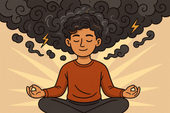
How to Regain Focus After Emotional Stress
After emotional stress, your nervous system feels frayed — your focus fades, thoughts race, and calm seems impossible. Learn how to restore balance, rebuild concentration, and retrain your brain for clarity and peace through evidence-based mind–body tools. 🌿
-
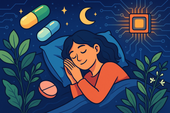
The Future of Sleep Supplements
The future of sleep supplements is here — where science meets nature. Discover how next-generation formulas use adaptogens, amino acids, and biotech innovations to support deep, restorative sleep without dependency. 🌙
-
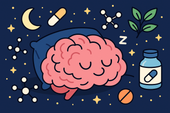
Emerging Research on Sleep and Nootropics
Can nootropics help you sleep better? Discover how compounds like L-theanine, magnesium threonate, ashwagandha, and Alpha-GPC influence neurotransmitters, circadian rhythm, and brain recovery — bridging the gap between smarter days and deeper nights. 🌙
-

New Herbal Extracts for Deep Sleep
Discover the next generation of herbal extracts for deep sleep — from saffron and magnolia to jujube and lemon balm. Learn how these plant-based compounds calm the nervous system, balance cortisol, and promote truly restorative rest. 🌙
-
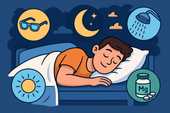
Sleep Biohacking: What Works and What Doesn’t
Biohacking your sleep can sound futuristic — from red light therapy to wearables and supplement stacks. But which hacks actually help, and which are just hype? Discover the science-backed sleep strategies that truly improve rest, recovery, and brain health. 🌙
-
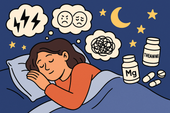
Sleep Support for People with Anxiety Disorders
💭 A restless mind can keep you up all night — thoughts spinning, heart racing, and peace feeling far away. Learn how to quiet overthinking, regulate your nervous system, and create a nightly ritual that teaches your brain to let go and rest deeply. 🌙
-
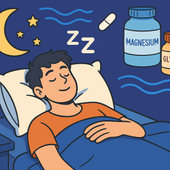
How to Fall Back Asleep After Waking Up
Waking up in the middle of the night? Learn how to fall back asleep quickly and calmly using breathing techniques, stress-reducing rituals, and natural supplements like magnesium and glycine. Restore your body’s rhythm and wake up feeling refreshed.
-
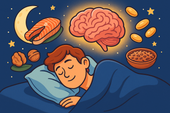
The Role of Omega-3s in Sleep Quality
-
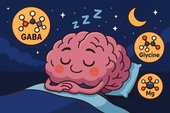
Stacking GABA and Glycine for Deeper Rest
Discover how stacking GABA and glycine can help you achieve deeper, more restorative sleep. Learn how these calming amino acids work together to relax your mind, soothe your body, and improve overall sleep quality—naturally and safely.
-

Overcoming Jet Lag with Supplements
✈️ Jet lag doesn’t have to ruin your trip! Discover how supplements like melatonin, magnesium, L-theanine, and tart cherry can help you reset your body clock faster, reduce fatigue, and recover energy naturally after long flights. 🌙
-

The Role of Magnesium for Night Cramps
Night cramps keeping you awake? Discover how magnesium helps relax muscles, balance electrolytes, and prevent painful spasms. Learn which forms work best, how to take them, and how to pair them with other nutrients for cramp-free, peaceful sleep.
-
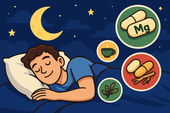
Supplements That Reduce Nighttime Awakenings
🌙 Discover science-backed supplements that help you stay asleep through the night. From magnesium and L-theanine to glycine and ashwagandha, learn how these natural compounds calm your nervous system, balance cortisol, and prevent 2 a.m. wake-ups for deeper, more restorative rest.
-

Nootropics That Promote Calm and Rest
Explore the world of calming nootropics — natural brain enhancers that promote relaxation, better focus, and deeper rest. Learn how L-Theanine, magnesium, ashwagandha, and other adaptogens help balance your nervous system, reduce stress, and support restorative sleep.
-

Best Natural Supplement Stack for Sleep
Discover the best natural supplement stack for deep, restorative sleep. Learn how nutrients like magnesium, L-theanine, glycine, and calming herbs such as chamomile and ashwagandha work together to relax your body, calm your mind, and improve sleep quality—naturally and safely.
-

Combining L-Theanine and Magnesium for Sleep: A Calm Night, Naturally
Discover how combining L-Theanine and Magnesium can help you drift into deep, restorative sleep. Learn how this natural duo calms the mind, relaxes the body, and supports your nervous system—without grogginess the next morning.
-

How to Sleep Better After Intense Workouts
Struggling to fall asleep after a tough workout? Learn how to optimize your post-training recovery with nutrition, hydration, and science-backed sleep strategies. Discover how to calm your nervous system, balance hormones, and wake up fully recharged for your next session.
-

Ashwagandha and Valerian: A Bedtime Combo for Deep Rest and Emotional Reset
Discover the calming synergy of Ashwagandha and Valerian root, two natural sleep aids that help quiet the mind, ease anxiety, and promote deeper rest. Learn how this herbal duo supports the nervous system, balances stress hormones, and restores emotional peace — without next-day grogginess.
-

How to Create a Resilience-Boosting Diet
Discover how to build emotional and physical strength from the inside out with a resilience-boosting diet 🍎. Learn which foods stabilize your mood, how supplements like magnesium and omega-3s strengthen your stress response, and why pairing nutrition with breathwork and therapy creates lasting calm, focus, and vitality 🌿💪.
-

Best Teas and Herbal Blends for Calmness: Nature’s Way to Restore Inner Peace
Ashwagandha, the ancient adaptogenic herb, helps your body find balance during stress. Known as “Indian ginseng,” it supports cortisol regulation, boosts energy, and restores calm clarity. Discover how this powerful root promotes resilience, emotional balance, and steady vitality — one cup at a time. 🌸
-

Parenting and Emotional Strength: How to Raise Children Without Losing Yourself
Empathy is the bridge that connects hearts — the quiet power to understand, feel, and support another’s emotions without judgment. Learn how empathy strengthens relationships, enhances communication, and cultivates deeper compassion in everyday life. 🌿
-

How to Bounce Back from Public Failure: Reclaiming Confidence, Purpose, and Power
Visualization is more than imagination — it’s brain training for resilience. By picturing calm, success, or healing, you activate the same neural pathways as real experience. Learn how daily visualization rewires your brain for confidence, emotional balance, and recovery from stress. ✨
-

Coping with Financial Stress Through Resilience: How to Stay Grounded When Money Feels Tight
Body awareness is the foundation of emotional resilience. By tuning into your body’s signals — tension, fatigue, or calm — you learn to recognize stress before it overwhelms you. Discover how mindfulness, gentle movement, and breathwork can deepen your connection with your body and restore balance from the inside out. 🧘
-

How to Stay Positive During Chronic Illness: A Guide to Emotional Strength and Hope
Creativity is more than art — it’s a form of healing. Whether through painting, writing, music, or small acts of expression, creativity helps release emotion, calm the nervous system, and reconnect you to joy. Discover how to use creativity as a tool for emotional balance, resilience, and self-discovery. 🌿
-

Resilience Tips for Caregivers: How to Stay Strong While Caring for Others
Joy isn’t the absence of pain — it’s the quiet strength to find light even in challenging times. Cultivating joy through small daily moments restores balance, releases stress, and reminds you of life’s beauty. Learn how to reconnect with authentic happiness, rebuild emotional energy, and nurture your nervous system through gratitude, presence, and play. 🌿
-

Building Resilience After a Breakup: How to Heal, Rebuild, and Rise Stronger
Social connection is one of the strongest predictors of emotional resilience. During difficult times, genuine relationships act as anchors — calming the nervous system, reducing stress hormones, and helping you regain perspective. Learn how cultivating real human connection can strengthen your mind, heart, and overall well-being. 🌿
-

How to Stay Emotionally Strong During Job Loss
Your emotions are powered by brain chemistry — a delicate balance of neurotransmitters like serotonin, dopamine, and cortisol. When these chemicals work in harmony, you feel calm, focused, and resilient. Learn how daily habits, nutrition, and mindfulness can support your brain chemistry and boost emotional well-being naturally. 🌿
-

The Role of Hormones in Emotional Stability: How Your Chemistry Shapes Your Calm
Hormones shape more than your body — they shape your emotions, resilience, and sense of calm. From cortisol to serotonin, these chemical messengers influence how you react to stress, connect with others, and recover from challenges. Learn how to balance your hormones naturally to build lasting emotional stability and harmony within. 💫
-

Mitochondria and Emotional Energy: The Cellular Power Behind Your Mood
Breathwork is one of the most powerful tools for emotional regulation and cellular balance. Through intentional breathing, you can calm your nervous system, increase oxygen flow to the brain, and even support mitochondrial energy. Learn how conscious breathing connects body and mind — transforming stress into presence and emotional strength. 🌿
-

Inflammation and Its Impact on Mood Resilience: The Silent Link Between Body and Mind
Inflammation doesn’t just affect the body — it impacts the mind. Chronic inflammation alters brain chemistry, depletes serotonin, and makes emotional recovery harder. Learn how calming inflammation through nutrition, mindfulness, and sleep can restore balance, resilience, and a renewed sense of emotional strength. 💫
-

How Antioxidants Protect Emotional Well-being: The Hidden Link Between Oxidative Stress and Mental Health
Antioxidants do more than protect your body — they defend your mind. By neutralizing oxidative stress, antioxidants support serotonin, dopamine, and brain energy pathways that keep you calm, focused, and emotionally balanced. Discover how foods like berries, green tea, and dark chocolate nourish your brain, boost mood, and strengthen resilience from the inside out. 🌿✨
-

The HPA Axis and Emotional Health: The Hidden Bridge Between Stress and Mind
Neuroplasticity — the brain’s ability to rewire and adapt — is the foundation of emotional healing and resilience. When you face stress, trauma, or change, your neural pathways can reshape themselves to support new patterns of calm, focus, and self-awareness. Learn how daily practices like mindfulness, therapy, and breathwork strengthen neuroplasticity to transform emotional pain into personal growth. 🌸
-

Why Cortisol Control Is Key to Resilience: Mastering Stress to Build Emotional Strength
Controlling cortisol — the body’s main stress hormone — is the secret to lasting resilience. When cortisol levels stay balanced, your mind becomes clearer, emotions steadier, and energy more sustainable. Learn how breathwork, mindset shifts, adaptogens, and daily rhythms can help you calm your stress response and build true inner strength. 🌞💪
-

Dopamine’s Influence on Motivation and Recovery: Reigniting Drive and Balance
Healthy relationships are the foundation of emotional balance and resilience. Whether romantic, familial, or platonic, genuine connection releases dopamine, serotonin, and oxytocin — the brain’s “bonding trio” — helping us feel secure, motivated, and seen. Learn how trust, empathy, and communication not only strengthen your connections but also reshape your nervous system for deeper emotional well-being. 🌿🤝
-

The Role of Serotonin in Resilience: How This “Mood Molecule” Shapes Emotional Strength
Serotonin — often called the “resilience molecule” — plays a vital role in how we handle stress, regulate mood, and recover from emotional challenges. Beyond happiness, this powerful neurotransmitter helps balance the gut-brain axis, stabilize the nervous system, and support emotional flexibility. Learn how nutrition, sunlight, mindfulness, and adaptogens can naturally boost serotonin and strengthen your emotional resilience. 🌞🧠
-

How Neuroplasticity Supports Emotional Growth: Rewiring the Brain for Resilience
Neuroplasticity is the brain’s built-in power to grow, adapt, and heal — and it’s the foundation of emotional transformation. Every mindful breath, compassionate act, or reframed thought strengthens new neural pathways that support resilience and self-awareness. Learn how your brain rewires through daily habits, helping you turn emotional challenges into opportunities for growth and calm. 🌿
-

Tai Chi and Adaptogens for Mind-Body Balance: The Art of Harmonizing Energy and Resilience
Alchemy isn’t just an ancient science — it’s a timeless symbol of transformation and inner balance. By blending the physical and spiritual, alchemy teaches us that change begins from within. Just as metals are refined into gold, we too can transmute emotional pain, stress, and chaos into clarity and strength through mindful practice and self-awareness. 🌙✨
-

Cold Therapy and Emotional Control: Training the Mind Through the Body
Cold therapy isn’t just for athletes — it’s a tool for emotional mastery. By exposing your body to controlled cold, you train your nervous system to stay calm under stress, improving focus, mood, and resilience. This article explores the science of cold exposure, its impact on hormones and the vagus nerve, and how ice baths and cold showers can help you build emotional control, one breath at a time. 🧊🧘♂️
-

How Music Influences Emotional Recovery: The Healing Soundtrack of the Mind
Neuroplasticity — the brain’s ability to rewire and heal itself — is at the heart of emotional recovery. Through mindful habits, music, therapy, and consistent mental stimulation, your brain can form new connections that support resilience and well-being. Discover how neuroplasticity turns pain into growth, helping you rebuild balance, focus, and emotional strength. 🌿
-

Nature Therapy for Building Resilience: Reconnecting With the Healing Power of the Earth
Nature therapy helps rebuild emotional resilience by reconnecting you with the healing rhythms of the Earth. From forest walks to sunlight exposure, nature restores balance to your nervous system, lowers stress hormones, and teaches emotional adaptability. Learn how spending time outdoors can enhance mental clarity, calm anxiety, and awaken your natural capacity to heal. 🌞
-

Breathwork Techniques That Pair with Supplements: The Ultimate Synergy for Stress Relief and Mental Clarity
Breathwork and supplements create a powerful mind-body synergy for stress relief, focus, and energy. By combining intentional breathing with adaptogens, nootropics, and calming nutrients, you can naturally regulate cortisol, sharpen mental clarity, and boost emotional balance. This guide explores the best breathwork techniques and supplement pairings to help you feel centered, calm, and energized from the inside out. 🌿
-

Why Cortisol Balance Matters for Emotional Strength
Balancing cortisol — your body’s main stress hormone — is essential for emotional resilience. When cortisol is chronically high, your mind stays stuck in survival mode, leading to fatigue, anxiety, and emotional instability. This article explores how nutrition, supplements, breathwork, and therapy can help restore healthy cortisol rhythms, regulate the nervous system, and strengthen your ability to handle life’s challenges with calm focus and emotional strength. 🌿
-

Best Supplements for Students During Exam Season: Focus, Energy, and Memory Support
Studying late into the night? Learn which natural supplements can boost focus, memory, and mental stamina during exam season — without the crash. From omega-3s to Bacopa and Rhodiola, discover your brain’s ultimate exam support stack. 🎓🧠
-

Natural Memory Boosters for Seniors: How to Keep Your Mind Sharp and Focused
Stay mentally sharp and confident as you age. Discover science-backed natural supplements and lifestyle habits that boost memory, focus, and brain longevity for seniors. 🌿🧠
-

The Link Between Stress, Cortisol, and Memory Loss
Chronic stress can quietly erode your memory — and cortisol is the key culprit. Learn how stress hormones affect the brain, why the hippocampus shrinks under pressure, and how natural strategies can help you restore memory and mental clarity. 🧠✨
-

How to Build a Daily Supplement Routine for Memory Health
Want to sharpen your memory and stay mentally clear? Learn how to build a daily supplement routine for memory health — from morning focus to nighttime brain repair. Discover science-backed nutrients that boost recall, focus, and long-term cognitive resilience. 🧠🌿
-

Top 5 Natural Supplements for Memory Recall and Focus
Looking to boost memory and concentration naturally? Discover the top 5 supplements — Bacopa, Ginkgo Biloba, Lion’s Mane, Rhodiola, and Phosphatidylserine — that enhance focus, recall, and long-term brain health. 🧠✨
-

Top Supplements to Balance Mood Naturally
From omega-3s to adaptogens, discover the top natural supplements proven to support emotional balance, reduce stress, and promote inner calm — safely and effectively. 🌿✨
-

Can Omega-3 Fatty Acids Help with Mood Disorders?
Omega-3 fatty acids do more than support heart health — they can help balance mood, reduce depression, and calm anxiety. Discover how EPA and DHA nourish your brain, fight inflammation, and support emotional well-being from within. 🌊🧠
-

Vitamin D and Mood: The Sunshine Vitamin for Emotional Balance
Could the key to emotional balance be as simple as a little sunlight? Discover how vitamin D — the sunshine vitamin — influences serotonin, reduces inflammation, and helps you feel more positive and resilient year-round. ☀️💛

















































